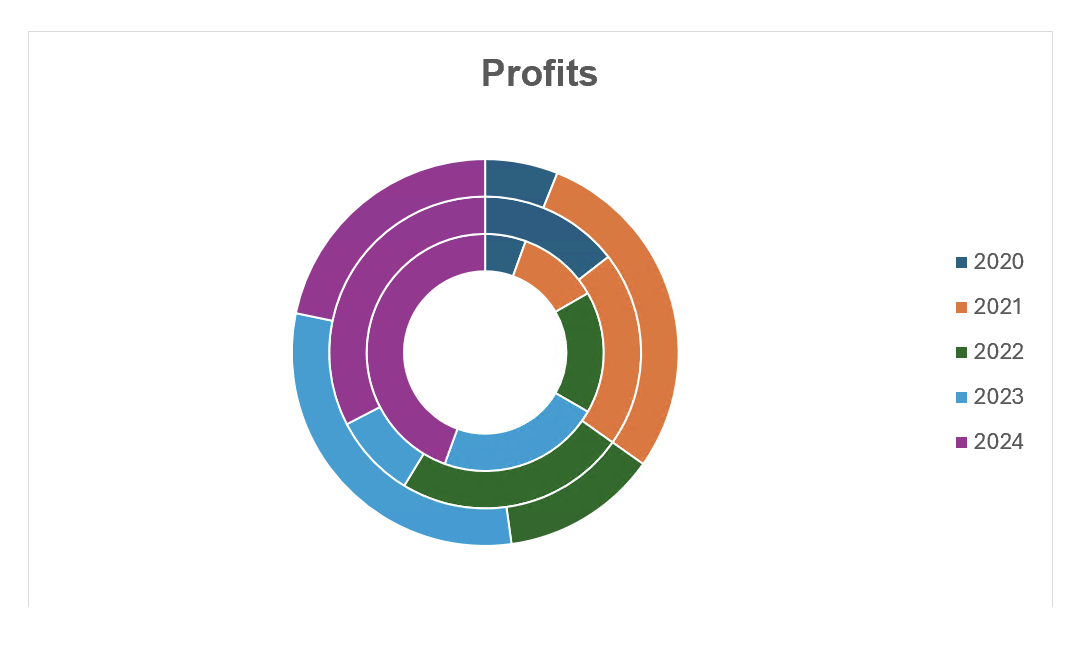
Xceed Workbooks for .NET v3.0 Documentation

'DeclarationPublic Class DoughnutChart Inherits PieChart
'UsageDim instance As DoughnutChart
public class DoughnutChart : PieChart
The code below would display the following Chart:

var workbook = Workbook.Create( ChartSample.ChartSampleOutputDirectory + @"AddCharts.xlsx" ); // Gets the first Worksheet. A Workbook always contains at least 1 Worksheet. var worksheet = workbook.Worksheets[ 0 ]; // Adds Values for Category. worksheet.Cells[ "B4" ].Value = 2020; worksheet.Cells[ "B5" ].Value = 2021; worksheet.Cells[ "B6" ].Value = 2022; worksheet.Cells[ "B7" ].Value = 2023; worksheet.Cells[ "B8" ].Value = 2024; // Adds Values for Series. worksheet.Cells[ "C4" ].Value = 20; worksheet.Cells[ "C5" ].Value = 28; worksheet.Cells[ "C6" ].Value = 33; worksheet.Cells[ "C7" ].Value = 12; worksheet.Cells[ "C8" ].Value = 45; worksheet.Cells[ "D4" ].Value = 7; worksheet.Cells[ "D5" ].Value = 33; worksheet.Cells[ "D6" ].Value = 15; worksheet.Cells[ "D7" ].Value = 35; worksheet.Cells[ "D8" ].Value = 25; // Adds a DoughnutChart with the generic Add method. The size of the Chart will be from Cell E4 to L18. var doughnutChart = worksheet.Charts.Add<DoughnutChart>( "E4", "L18" ); // Sets the Chart's Title. doughnutChart.Title.Text = "Profits"; doughnutChart.Title.TextOptions.Font.Bold = true; // Sets the Legend. doughnutChart.Legend.Position = LegendPositionType.Right; // Sets the Category data(x values) for the DoughnutChart : Cells B4 to B8. doughnutChart.CategoryData = CategoryData.FromCells( worksheet, "B4", "B8" ); // Adds DoughnutSeries to the DoughnutChart (y values) by specifying fixed values, a Range of Cells’ Adresses and a Range of Cells’ Row & Column ids. var doughnutSeries1 = doughnutChart.SeriesCollection.AddFromValues<DoughnutSeries>( 5, 10, 15, 20, 40 ); doughnutSeries1.Name = "IBM"; var doughnutSeries2 = doughnutChart.SeriesCollection.AddFromCells<DoughnutSeries>( "C4", "C8" ); doughnutSeries2.Name = "Apple"; var doughnutSeries3 = doughnutChart.SeriesCollection.AddFromCells<DoughnutSeries>( 3, 3, 7, 3 ); doughnutSeries3.Name = "Amazon"; // Sets the hole size of the Doughnut chart. doughnutChart.HoleSize = 42; // Saves workbook to disk. workbook.Save();
System.Object
Xceed.Workbooks.NET.WorkbookElement
Xceed.Workbooks.NET.WorksheetElement
Xceed.Workbooks.NET.PositionedElement
Xceed.Workbooks.NET.Chart
Xceed.Workbooks.NET.PieChart
Xceed.Workbooks.NET.DoughnutChart
| Name | Description | |
|---|---|---|
 | DoughnutChart Constructor | Creates a DoughnutChart in the Worksheet. |
.NET: net5.0, net5.0-windows, net6.0, net6.0-macos, net6.0-windows, net7.0, net7.0-macos, net7.0-windows, net8.0, net8.0-browser, net8.0-macos, net8.0-windows, net9.0, net9.0-browser, net9.0-macos, net9.0-windows, net10.0, net10.0-browser, net10.0-macos, net10.0-windows.
.NET Framework: net40, net403, net45, net451, net452, net46, net461, net462, net463, net47, net471, net472, net48, net481.